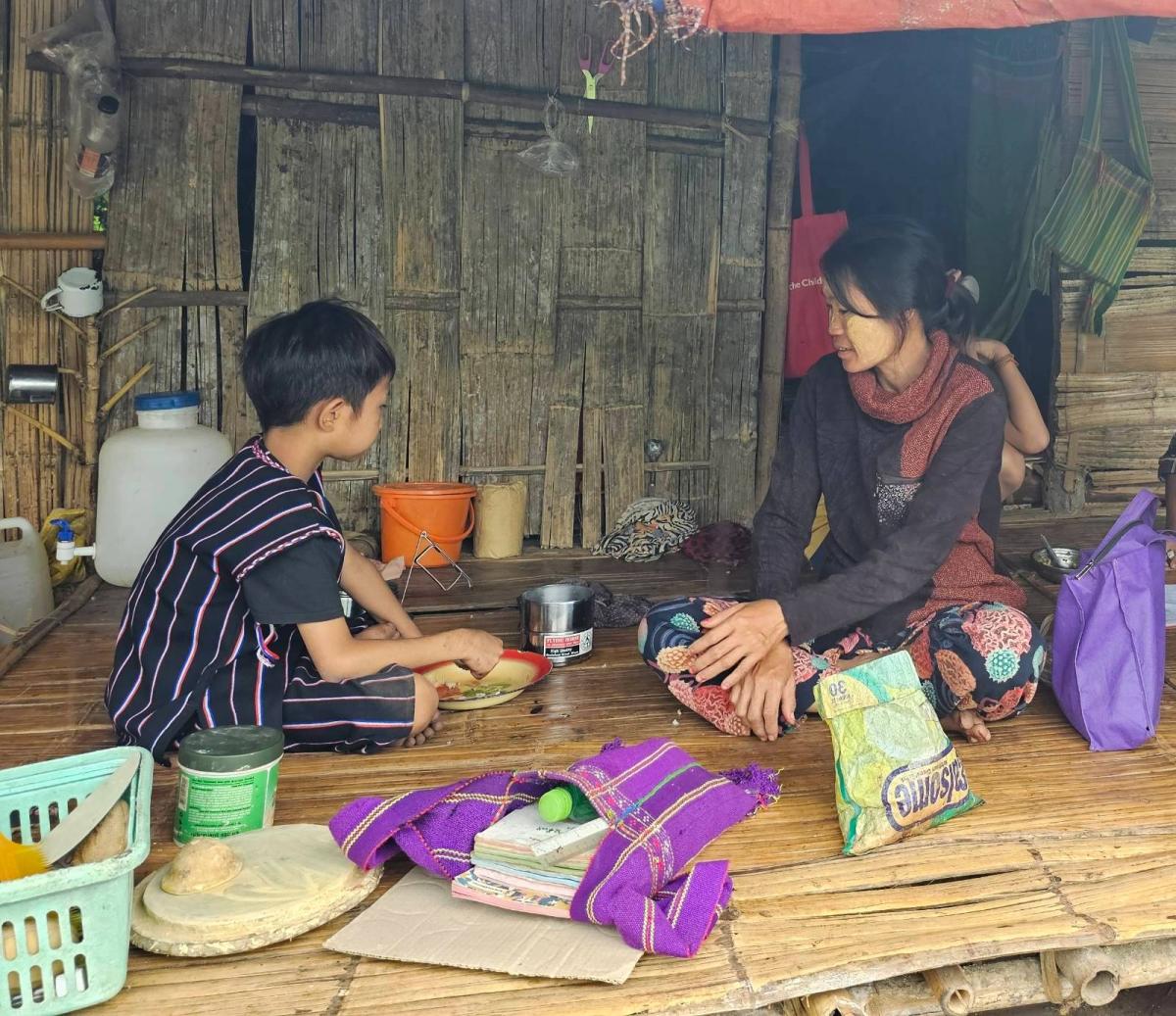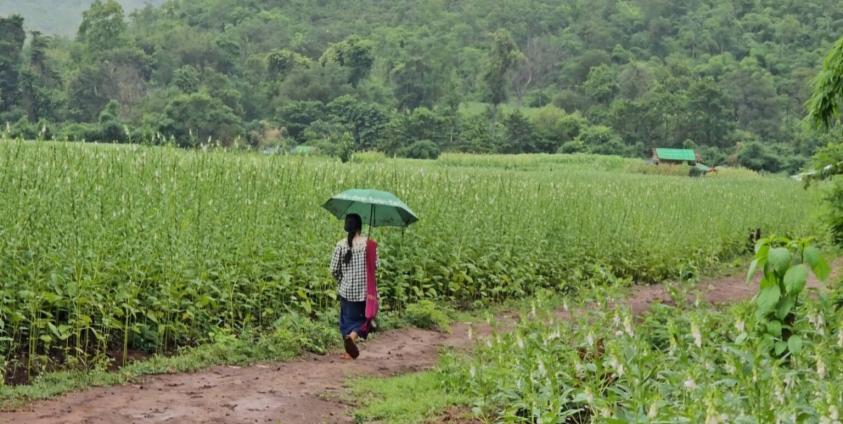When I visited the Pon Creek displaced person’s (IDP) camp No.4 camp in Demoso Township, Karenni State I found the residents had followed the Burmese proverb that says 'build a market in your backyard,’ and had planted edible crops and fruit trees around their huts.
The IDPs in Pon Creek IDP Camp 4 mainly come from other areas of Demoso Township, including the towns of Bawlakhe, Pharsaung, and Ywarthit. Nearly all the families in the camp cultivate small fields of sesame and rice to help feed themselves. If they have anything left over they sell it to provide themselves with a basic income.
If they have excess sesame seed to sell they have to transport it to market in oxcarts because the IDP camp is hard to access and road conditions are too bad for trucks, cars and motorcycles to use them.
It was a rainy day when I visited Pon Creek IDP Camp 4. When I arrived Mawtarmal, an IDP woman of about 40 years of age was sitting on the verandah of her small hut next to a huge sesame field. She invited me in and we had a conversation about her life and conditions in the IDP camp.
Mawtarmal and her family of five fled to the IDP camp from Dawngaykhu Village in Demoso Township.
As it was lunchtime, her children had returned from school for lunch. I took the opportunity to ask the whole family about their experiences living in the IDP camp.
When I asked them if the sesame field in front of their hut was theirs, they said no and told me that their sesame field was about a 30-minute walk away. They sell the sesame they grow to provide themselves with a small income. As well as the sesame field the family also had a small paddy field where they were growing rice for their own consumption.
 Mawtarmal said: “I'll do my best in the field. For rice, we’ll harvest as much as we can get. It gives us one or two meals [a day], every bit helps.”
Mawtarmal said: “I'll do my best in the field. For rice, we’ll harvest as much as we can get. It gives us one or two meals [a day], every bit helps.”
It is a daily struggle for her to provide food and water for her family. She said that though she can adapt to living anywhere she always has concerns about being able to provide enough food for her three children.
Prolonged displacement has led to feelings of inferiority and shame amongst IDPs who feel embarrassed about having to always ask for help.
So, even in the face of great hardship, many of the IDPs are trying to find ways to reduce the burden on their host communities and aid providers by trying to produce some of their own food. Despite this, sometimes the IDPs' meagre crops fail and they are completely reliant on donations.
Khu Tiyal, a member of the Pon Creek IDP Camp 4 Committee said: “We always face losses. Almost everyone who cultivated last year experienced losses. Our expenses and income from farming aren't balanced out. It only works for a few people.”
But, despite such losses Khu Tiyal admitted that the IDPs cannot just rely on donations for their survival.
He said: “We've been saying that we can't just rely on donations. Donors are facing difficulties too. So, we need to do what we can and what we're able to, [like] finding a daily wage job and spending our earnings on what we need.”
But, Mawtarmal emphasised how important donor aid still is to the IDPs saying: "With the ongoing political crisis and our displacement to remote areas, we IDPs continue to face many challenges, including a lack of stable employment. Therefore, we still rely on donations and need support from donors.”
Another person living in Pon Creek IDP Camp 4 is 60-year-old Khu Pa Reh, who fled there from Taneelarle Village in Demoso Township about three years ago. He can no longer travel to his own fields in Taneelarle Village, instead, he is cultivating a small sesame patch near to his makeshift IDP hut.
He said: “I believe that we need to do everything we can. As long as we're capable of working, we should. We can't just rely on donors to help us. It's been two to three years since we became IDPs. I think that I need to work as much as I can to make a living.”
Despite being able to grow their own food Khu Pa Reh and his family still face frequent food shortages, but fortunately for them they have other displaced friends living nearby who they can borrow food from. They typically pay back what they have borrowed using money earned working on daily wage jobs or from donations.
After expressing his gratitude for his friends’ generosity, Khu Pa Reh remarked on his family’s comparative good fortune saying: “I often wonder what the other people would do if they were in our situation. It's lucky that some people still have enough to survive. We can borrow from them.”
Many IDPs in Karenni State are trying to cultivate some sort of crops. Those sheltering in the forest just plant on land near their shelters, whereas those sheltering in villages away from fighting will either rent local land on which to plant crops or be allowed to use land for free.
Whilst it may still be too dangerous for IDPs who were farmers to return to live in their homes they may still attempt to go back and tend to their farms during gaps in the fighting, if they are not too far away.
Some farmers from Demoso Township who are now IDPs elsewhere in the township and just return to tend their farms are concerned that they will lose their crops because a junta offensive will keep them away from their farms at harvest time.
Since the third week of August, a junta column of about 200 troops has been advancing from the Karenni State capital, Loikaw Town, to Demoso Town along the Loikaw to Demoso highway. As a result, IDPs with farms in their home villages of Dawpoesi, Sanpya Chaukmaing, and Ngarmaing in Demoso Township are worried that fighting will prevent them from returning to harvest their crops.
The Karenni State Interim Executive Council (Karenni IEC), a provisional Karenni State government that is administering most of Karenni State has called on IDPs staying in Karenni State to contribute in any way they can, to the local communities where they are sheltering.







